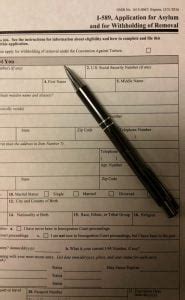The concept of asylum has been a cornerstone of international humanitarian law, providing a safe haven for individuals fleeing persecution, war, and natural disasters. However, the increasing number of frivolous asylum applications has raised concerns among governments, policymakers, and stakeholders. In this article, we will delve into the world of frivolous asylum applications, exploring the reasons behind this phenomenon, its consequences, and potential solutions.
What are Frivolous Asylum Applications?
Frivolous asylum applications refer to claims for asylum that are not based on a genuine fear of persecution or a well-founded fear of being harmed in the country of origin. These applications often lack credible evidence, and the applicants may not meet the eligibility criteria for asylum. In some cases, individuals may submit multiple applications, knowing that the process can take years, and they can remain in the host country while their claims are being processed.

Reasons Behind Frivolous Asylum Applications
Several factors contribute to the rise of frivolous asylum applications. Some of these reasons include:
- Economic opportunities: Many individuals may seek asylum as a means to gain access to better economic opportunities, rather than fleeing persecution or harm.
- Lack of understanding: Some applicants may not fully comprehend the asylum process or the eligibility criteria, leading to unfounded claims.
- Manipulation: In some cases, individuals may be coached or manipulated by smugglers, lawyers, or other third parties to submit false or exaggerated claims.
- Delaying deportation: Frivolous asylum applications can be used as a tactic to delay deportation proceedings, allowing individuals to remain in the host country for an extended period.
Consequences of Frivolous Asylum Applications
The consequences of frivolous asylum applications are far-reaching, affecting not only the asylum system but also the host country and genuine asylum seekers.

- Overburdened asylum systems: Frivolous applications can clog the asylum system, leading to significant delays and backlogs, which can result in genuine asylum seekers waiting for years for their claims to be processed.
- Resource waste: Processing frivolous applications requires significant resources, including time, money, and personnel, which could be better spent on genuine cases.
- Decreased credibility: The rise of frivolous applications can erode the credibility of the asylum system, making it more challenging for genuine asylum seekers to have their claims taken seriously.
Solutions to Address Frivolous Asylum Applications
To address the issue of frivolous asylum applications, governments, policymakers, and stakeholders must work together to implement effective solutions.
- Improved education and awareness: Educating potential applicants about the asylum process and eligibility criteria can help reduce the number of frivolous applications.
- Strengthened screening processes: Implementing robust screening processes can help identify and filter out unfounded claims, reducing the burden on the asylum system.
- Enhanced cooperation: International cooperation and information sharing can help identify and prevent individuals from submitting multiple applications in different countries.

Gallery of Asylum and Immigration Images






Frequently Asked Questions
What is the difference between an asylum seeker and a refugee?
+An asylum seeker is an individual who has applied for asylum in a host country, while a refugee is an individual who has been recognized as meeting the criteria for asylum and has been granted refugee status.
How can I apply for asylum?
+To apply for asylum, you must submit an application to the relevant authorities in the host country, providing evidence of your fear of persecution or harm in your country of origin.
What is the process for determining asylum claims?
+The process for determining asylum claims involves a thorough examination of the applicant's claim, including an interview and review of evidence, to determine whether the applicant meets the eligibility criteria for asylum.
As the world grapples with the complexities of asylum and immigration, it is essential to address the issue of frivolous asylum applications. By understanding the reasons behind this phenomenon and implementing effective solutions, we can work towards a more efficient and credible asylum system that protects the rights of genuine asylum seekers.
